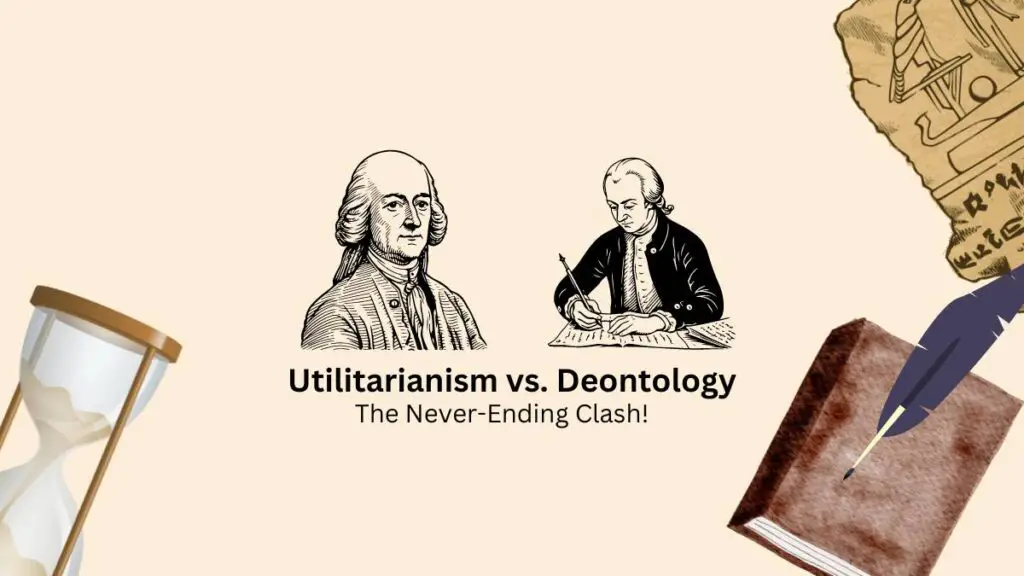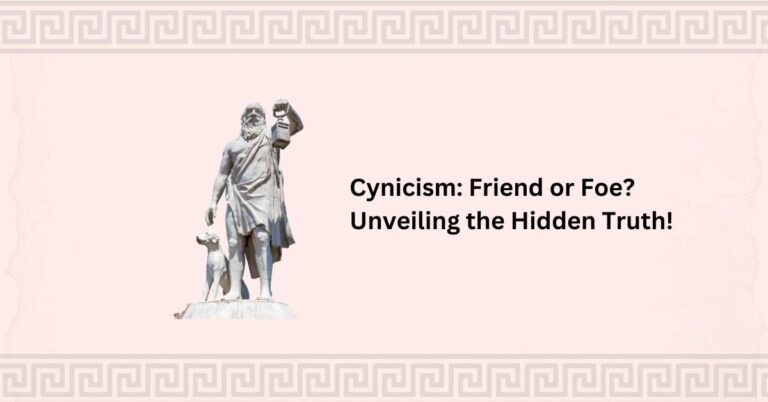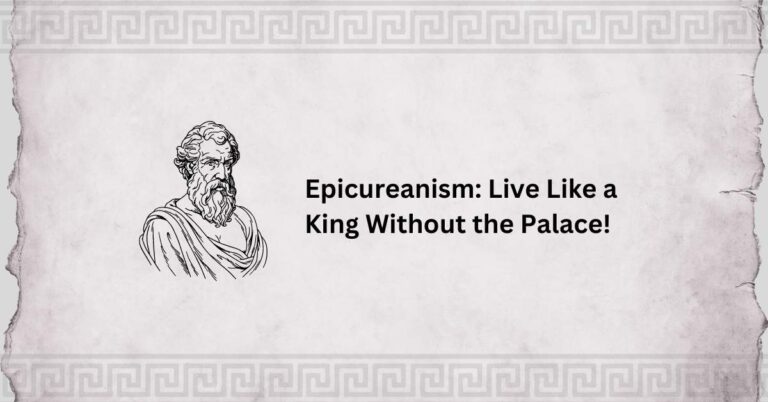Utilitarianism vs Deontology: The Never-Ending Clash!
Ethics, in the world of philosophy, is like a compass for moral decisions. But what exactly are these ethical frameworks everyone talks about?
Imagine you’re faced with a choice: save one person you love or five strangers. Tough, right? This dilemma captures the essence of two major ethical theories: Deontology and Utilitarianism.
Today, we’re diving into Utilitarianism vs Deontology. These are two heavyweights in the ethics arena. Understanding them isn’t just for philosophers; it’s for anyone who faces moral choices. Spoiler alert: that’s all of us!
In this blog, we’ll cover the basics of each theory, their main principles, and how they apply in real life. Ready to get your ethical thinking cap on? Let’s break it down!
What is Utilitarianism?
Utilitarianism was introduced by Jeremy Bentham and later polished by John Stuart Mill in the 18th and 19th centuries. This theory is like being an enthusiastic event planner aiming to make as many people happy as possible. Utilitarianism falls under the bigger umbrella of Consequentialism, which judges actions by their outcomes.
The core idea? Happiness is king. The principle of greatest happiness means that if an action maximizes pleasure and minimizes pain, it’s a winner. This is known as Consequentialism. Here, the ends do justify the means.
Utilitarianism evaluates actions based on their overall consequences, aiming to maximize overall happiness or well-being. This includes considering the intensity, duration, and distribution of happiness and suffering caused by an action.
Picture this: A doctor has five patients needing organ transplants and one healthy donor. Should the doctor sacrifice one to save five? Utilitarianism might say yes. It’s all about the outcome.
But hold on. There are some rough edges. Critics argue it can justify some pretty shady stuff if it leads to a happier end. Imagine using this logic to excuse harmful actions. Yikes!
Utilitarianism shines in practical applications like policy-making and economics. However, misuse can lead to moral grey areas where the individual gets lost in the crowd.
What is Deontology?
Deontology simply means focusing on duty and rules. It’s like being a dedicated scout following a handbook. Immanuel Kant, the brain behind this theory, believed that what makes an action right isn’t its outcome but whether it follows a moral rule. Think of it as always telling the truth because honesty is a universal rule, even if it gets you into trouble.
Deontology is a broader ethical framework that emphasizes moral duties, rules, and principles as the foundation for determining right and wrong actions. It asserts that some actions are inherently right or wrong, regardless of their consequences. Deontology encompasses various ethical theories, including Kantianism.
Kantianism is a specific type of Deontology developed by philosopher Immanuel Kant. It centers around the concept of the “categorical imperative,” a universal moral law that applies to everyone.
Kant introduced the idea of Kantian imperatives. There are two types: categorical (unconditional rules) and hypothetical (conditional rules). Think of it like this: If lying is wrong, it’s always wrong, no matter what.
Imagine you find a wallet full of cash. Deontology says you should return it because it’s your duty, not because of the outcome. The rule is what matters, not the consequence. This theory values moral absolutes. But it’s also criticized for being too rigid. What if sticking to a rule causes harm? That’s where Deontology can hit a snag.
In practice, Deontology is seen in legal systems and personal moral codes. It’s great for clear guidelines but can struggle with complex situations where rules conflict.
Key Differences Between Utilitarianism and Deontology:
When comparing Utilitarianism vs Deontology, it’s like comparing apples and oranges. Both are ethical theories, but their core principles are miles apart.
Foundational Principles
Utilitarianism is grounded in outcomes. It’s all about the results and the happiness generated. Think of it as a math problem where you calculate the net pleasure or pain.
Deontology, on the other hand, is rooted in duty. It’s about following rules and doing what’s morally right, no matter the outcome. Imagine a strict code of conduct that you must adhere to.
Decision-Making Processes
In Utilitarianism, you weigh the consequences. What’s the end result? Does it bring the most happiness? It’s like playing chess, thinking several moves ahead.
With Deontology, decision-making is about principles. Is the action itself right or wrong? Picture a judge who strictly follows the law without considering the consequences.
Real-Life Implications
In real life, these theories can lead to very different choices.
Take a common ethical dilemma: lying to save a life.
- Utilitarianism might say go ahead and lie if it saves someone, as the outcome is positive.
- Deontology would likely argue against lying, as it breaks a fundamental rule, regardless of the positive outcome.
Example Ethical Dilemma
Scenario: You’re hiding a friend from a dangerous person who asks you where they are.
- Utilitarianism Approach: Lie to protect your friend. The happiness of saving a life outweighs the harm of lying.
- Deontological Approach: Tell the truth or avoid lying directly. Lying is inherently wrong, no matter the situation.
Summary of Main Contrast. Let’s break it down into a quick comparison:
Aspect |
Utilitarianism |
Deontology |
Core Principle |
Outcome-based (Greatest Happiness) |
Duty-based (Following Rules) |
Decision Focus |
Consequences of actions |
Nature of actions |
Moral Rule Flexibility |
Flexible, based on situational outcomes |
Rigid, based on universal rules |
Ethical Dilemma Handling |
Lying can be justified if it leads to greater good |
Lying is wrong regardless of consequences |
Real-World Examples |
Policy-making, economics, public health decisions |
Legal systems, personal moral codes, professional ethics |
By understanding these key differences, you can see how each theory applies uniquely to ethical dilemmas and everyday decisions. Now, let’s dive into how these theories stack up in terms of strengths and weaknesses.
Common Misconceptions and Clarifications:
Ethical theories often get a bad rap due to misunderstandings. Let’s clear up some common misconceptions about Utilitarianism vs Deontology.
Misconception 1: Utilitarianism Always Justifies Harmful Actions if They Benefit the Majority
People often think Utilitarianism means you can do anything as long as it makes most people happy. But that’s a bit off the mark.
Sure, Utilitarianism focuses on the greatest good. But it doesn’t give a free pass to harmful actions. For example, a true utilitarian wouldn’t justify torture just because it might lead to some greater good. They’d weigh the long-term consequences and the overall happiness.
Misconception 2: Deontology Ignores the Consequences of Actions
Another myth is that Deontology doesn’t care about outcomes at all. It’s true that Deontology prioritizes rules and duties. But it doesn’t mean consequences are irrelevant.
For instance, Kant’s theory includes the idea of a “Kingdom of Ends,” where one should act according to maxims that everyone can follow. This inherently considers the broader impact of actions, even if indirectly.
Clearing Up with Examples
Imagine you’re a software developer:
- Utilitarian Approach: If you’re designing an app, you might prioritize features that benefit the majority of users, even if it means some users face minor issues. The goal is to achieve the overall happiness of the user base.
- Deontological Approach: You’d follow strict coding ethics, like not stealing code, even if it means your app takes longer to develop. The rule of integrity is your guiding light.
By understanding these nuances, we see both theories are more balanced than the misconceptions suggest.
The Relevance of Utilitarianism and Deontology Today:
Now, let’s look at how Utilitarianism vs Deontology plays out in today’s world. These theories aren’t just academic—they’re very much alive and kicking.
Application in Contemporary Ethical Issues:
Both theories help navigate modern dilemmas. Let’s see how.
Use Cases in Technology, Healthcare, and Business
- Technology (AI Ethics): In AI, Utilitarianism might guide the development of algorithms that benefit the most users. Deontology, however, ensures the AI respects user privacy and follows ethical guidelines.
- Healthcare (Triage Ethics): During crises like pandemics, Utilitarianism might prioritize resources for those with the best chances of survival. Deontology would ensure that each patient is treated with inherent dignity and respect, regardless of their chances.
- Business (Corporate Responsibility): Companies might use Utilitarian principles to optimize profit and stakeholder happiness. Yet, Deontological ethics would demand honesty in advertising and fairness in labor practices, irrespective of profit outcomes.
Influence on Modern Legislative and Personal Moral Decisions
These theories also shape laws and personal choices.
- Legislative Decisions: Laws often reflect a blend of both theories. For example, public health laws might follow Utilitarian principles to benefit the majority. Meanwhile, human rights laws are rooted in deontological ethics, which ensure basic rights are upheld.
- Personal Moral Choices: On a personal level, you might find yourself juggling both. Deciding to report a minor theft at work follows Deontological duty. Yet, supporting a friend through a tough time by bending some rules might lean towards Utilitarianism.
In the modern world, understanding Utilitarianism and Deontology helps us navigate complex ethical landscapes with a balanced view.
Conclusion:
Navigating the ethical landscape can be daunting, but understanding frameworks like Utilitarianism and Deontology can provide valuable guidance. These theories offer distinct approaches to moral reasoning, each with its strengths and limitations.
Utilitarianism teaches us to consider the outcomes of our actions and strive for the greatest happiness. It’s practical in many real-world applications, from policy-making to everyday decisions that affect the greater good. However, it also warns us of the potential pitfalls of justifying harmful actions if they seem to benefit the majority.
On the other hand, Deontology emphasizes the importance of duty and following moral rules, regardless of the consequences. It offers a robust framework for upholding ethical principles and human rights, ensuring that certain actions are inherently right or wrong. Yet, its rigidity can sometimes pose challenges in complex situations where rules may conflict.
Both theories are integral to contemporary ethical discussions, influencing everything from AI development to healthcare decisions and corporate responsibility. By understanding and applying these frameworks, we can make more informed, balanced, and ethical choices in our personal and professional lives.
As you reflect on these theories, consider how they might shape your own decision-making processes. Whether you lean towards the outcome-focused approach of Utilitarianism or the rule-based perspective of Deontology, being aware of these ethical frameworks equips you to face moral dilemmas with greater clarity and confidence.
Thank you for joining us in this exploration of Utilitarianism vs Deontology. Stay curious, and keep questioning the ethical dimensions of the world around you.



